Have you ever thought of having a career in national space defense? Imagine yourself as one of the Space and Missile Systems Center (SMC)’s 6,000 person team. As the center for acquiring and developing military space systems for the U.S. Space Force, do not self-limit — you can be a part of America’s space renaissance even without a Science, Technology, Engineering, and Mathematics (STEM) degree.
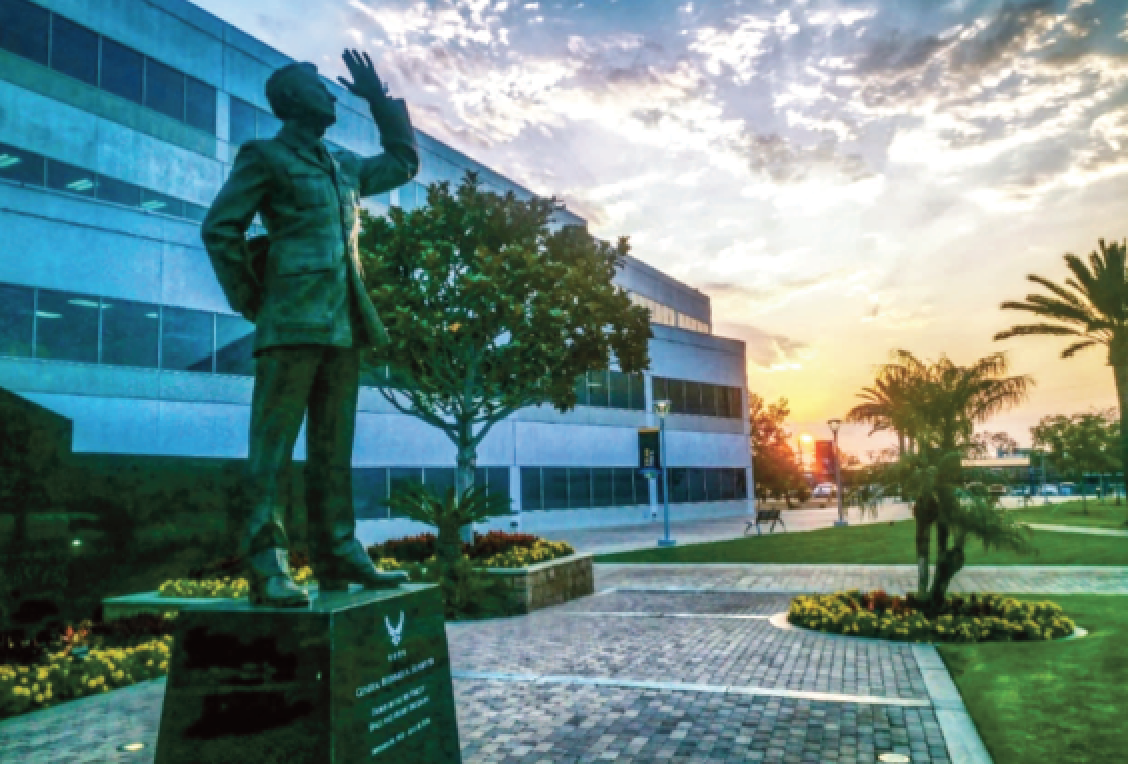
SMC memorial to General Bernard A. Schriever at Los Angeles Air Force Base, El Segundo, California, at sunrise. Schriever is considered to be the father of the Air Force’s space and missile program. The statue was donated to SMC by the the Air Force Association’s Schriever Chapter. Photo is by Van de Ha, SMC.
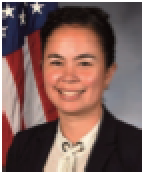
Aine Nakai
“People have this misconception that you have to join the military,” said Aine Nakai, the Director of Talent Management at SMC. “You can serve your country as a civil servant or a contractor – you don’t have to wear a uniform, you don’t have to deploy.”
SMC’s Talent Management team is responsible for overseeing the career development, training, recruitment, hiring, retention and branding for SMC and the Los Angeles Air Force base as well as units at Peterson Air Force Base in Colorado and Kirtland Air Force Base in New Mexico. Nakai monitors the careers of nearly 5,000 military, civilian and contractor personnel in the finance, program management, engineering, human resources, contracting, and logistics career fields.
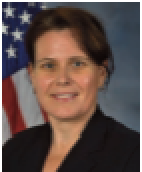
Samantha Cox
Samantha Cox, the Director of manpower and personnel at SMC, focuses on placement of senior military personnel and senior civilians at SMC. “There isn’t a single path for civilian careers: someone might serve in the military, separate from the service and then take a job with a government contractor or elect to compete for a federal civilian job and then be hired at SMC,” she explained. “We hire individuals from other Government organizations as well as looking to bring in talent from industry — the corporate sector — that have relatable experience and can bring that experience to get the job done, but also a new perspective on how to get that job done, faster.
“ I am looking to hire from the entry-level mail room clerk to do sorting and collecting mail, to the Program Executive Officer level and other support in our senior ranks in program management, contracting, and finance management.”
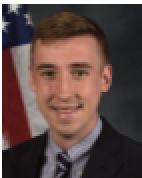
Tucker White
Tucker White, 25, was a sophomore studying aerospace engineering at Embry-Riddle Aeronautical University when he heard about a U.S. Department of Defense (DoD) scholarship, the SMART scholarship, that helped pay for his education in exchange for a three-year service commitment as a civilian.
He completed two summer internships at SMC and now, with his bachelor’s and master’s degrees in aerospace engineering, has been working fulltime at SMC for more than two years. He’s now a deputy chief engineer in the Production Corps, where he works on the Space-Based Infrared System (SBIRS) program.
If he hadn’t discovered SMC through the scholarship, “I probably would have looked to one of the prime contractors,” White said. “They hire a lot of kids right out of college and I know some that have gotten great jobs. But I think when you start off with a prime, you don’t have a lot of responsibility and you’re working on small components that may or may not get into space someday. At SMC, I’m looking at the bigger picture — not just the individual screws and designing bits of satellites, but looking at the entire satellite, how does it fit into the space architecture and how does it help the warfighter?
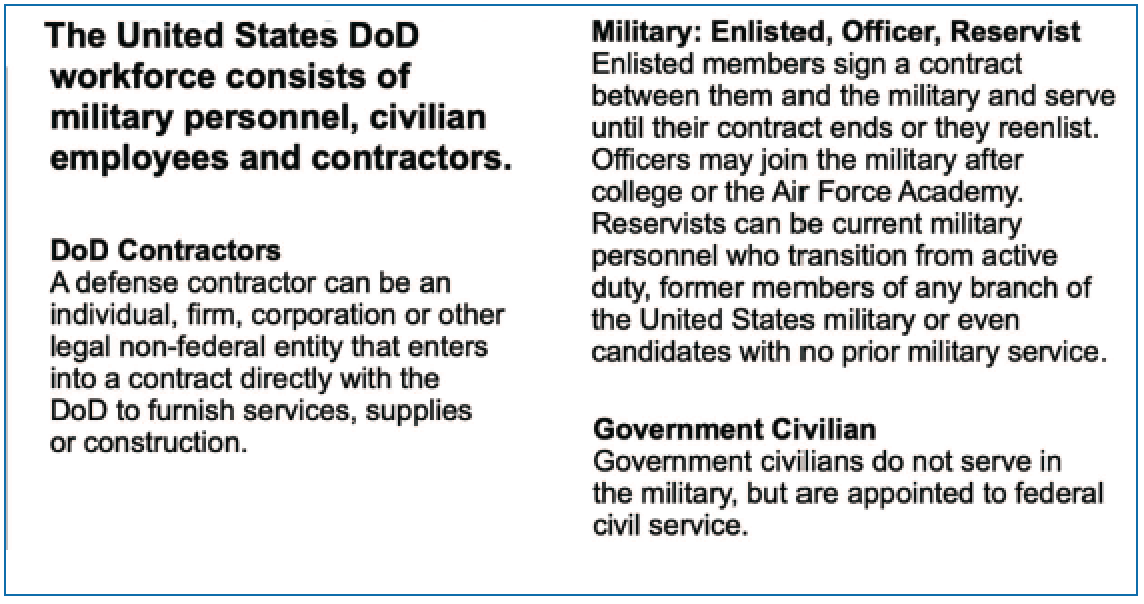
“I get great mentorship here, not only from other civilians, but the Air Force instills a lot of discipline and you get to see the work ethic your coworkers have. In the Air Force, they really value the work/life balance: they want you to work hard, but also care for you as a person. They want to get to know you, and work with your career so you can be in a place where you’re going to thrive the most.”
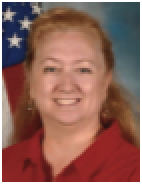
Lisa Prosser
“People may not realize we have a lot of contractors who work here,” said Lisa Prosser, Contracting Officer with Atlas Corps’ Directorate of Contracting. “Los Angeles Air Force Base is what’s called a systems acquisition base. You have the operations bases, where they fly the aircraft and conduct flight missions. SMC buys, builds and sustains satellites and the launch services that deliver them to orbit.”
Prosser, who is also a disabled Air Force veteran who served as a K-9 handler, works in the Specialized and Enterprise Contracting division at SMC where they contract for advisory and assistance services (A&AS) to complement the military and civilian workforce in areas that are difficult to fill organically.
“Many are military veterans,” said Prosser. “We consider our A&AS contractor workforce our wingmen as well. It takes a three-pronged approach – military, government civilians and contractors to have a complete workforce here.” Prosser said.
USAJobs.com is the primary source for civilian employment at SMC. Many jobs require some sort of security clearance, so a clean record and ability to obtain a security clearance is important.
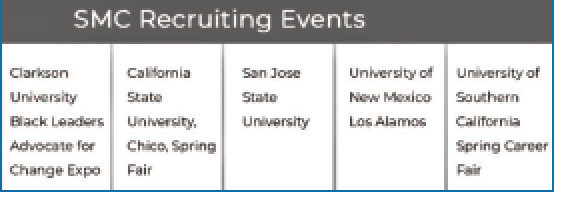
Since September, SMC has participated in career fairs at numerous universities as well as a virtual hiring event in November 2020, due to COVID-19 restrictions. SMC has recruited via LinkedIn for some specific roles, as well.
“We had 1,100 resumes from interested folks — it was an overwhelming response and very inspiring,” Nakai said of the November 2020 event. “We’re still referring to resumes and conducting interviews. With the buzz surrounding standing up the Space Force, we want to ensure that talent management will support individual
development needs rather than a one-size-fits-all approach to make the Space Force an employer of choice.”
Both the USAF and the USSF are fully supportive of Airmen, Guardians and all employees’ desires to continue to develop professionally after they’re hired, which is why SMC has created and implemented initiatives such as SMC Management and Resourcing Tool (SMART) for paperless in-processing, and the Strategic Career Action Plan Tool, to make Airmen and Guardians aware of training and other opportunities to advance their careers, Nakai added.
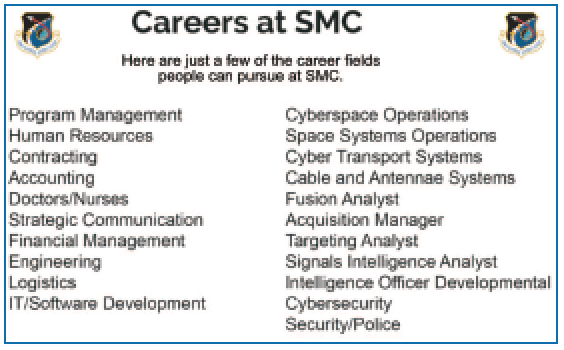
People who can think on their feet and show initiative are likely to do well working with the government, Prosser said. “It’s up to you to take control of your career; the government doesn’t spoon-feed.”
“What you need to be is adventurous, which means open to new experiences,” Cox said. “We just iterated into the U.S. Space Force so we’re doing things differently, we’re shaking things up. People often say employees need to be ‘flexible’ and ‘agile’ but that’s too simple. We need people who aren’t afraid to make mistakes, to learn at risk.”
“Too often in the history of government employment, you’re working from a continuity binder and you’re going to get step-by-step instructions on how to get from Point A to the signature at the end of the line to take action,” Cox said. “But we need people who can challenge that continuity binder and say ‘This is great, but this way might be faster.’ Maybe they learn that we’re doing it this way for a good reason, so let’s keep it. But we’re leaning toward people who are emboldened, empowered and experienced to make the choices that they’re authorized to make at the appropriate level; the GS-11 Buyer is not making choices your three-star general is accountable for.”
It’s not enough to have a great-looking resume, Nakai said. SMC needs people with solid “soft skills” to work well in a team environment.
“We want people who have a passion to be something greater than themselves, the desire to join a dynamic team and to be excited to execute the mission,” Nakai said. “It’s important to be a team player — we have a lot of integrated product teams — program management, engineering, finance, logistics and contracting all coming together to acquire systems to deliver to the warfighter.”
“SMC is a place where you can grow and develop, just like you can at a Google or a Microsoft or SpaceX — give a chance to the government,” Cox said. “We’re not the stodgy employer of the past – you can work here and touch space today.”
To learn more about careers at SMC and the USSF, visit Space Force Careers or https://www.losangeles.spaceforce.mil/

